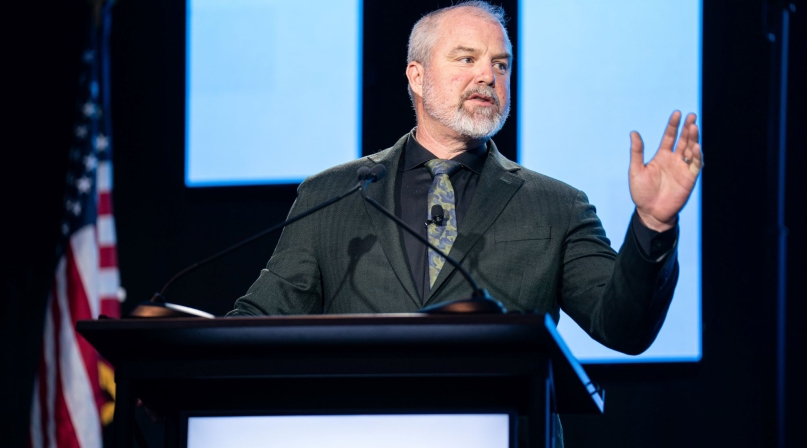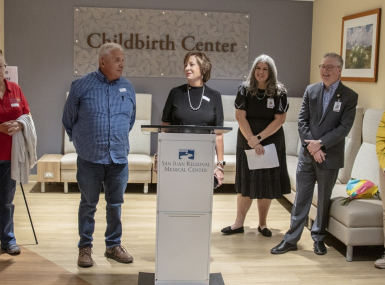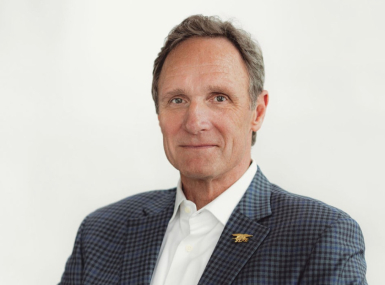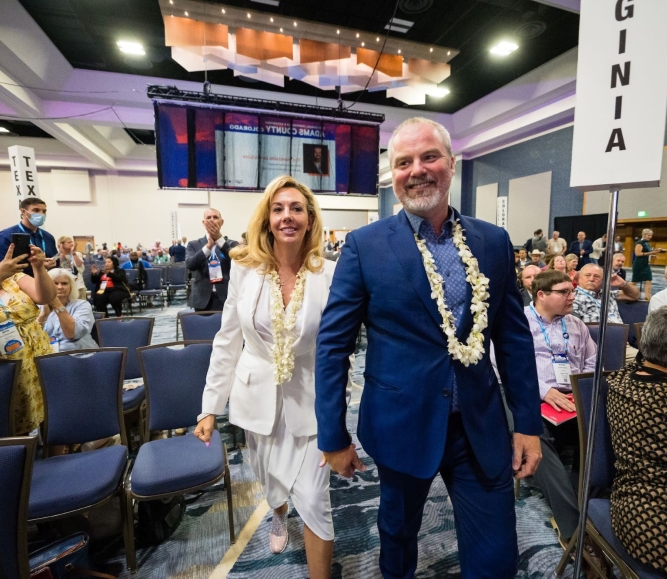James Gore looks back on his year as NACo president

Sonoma County, Calif. Supervisor James Gore, now in his third term, has served as NACo president since 2024 and will become the association's immediate past president on July 14.
Q: The theme of your presidency has been “we” — we the counties, we the leaders and we the future. What led you to center your presidential spotlight on unity?
A: I know that [unity] is how we get things done locally, and it is what our country desperately needs. Disagreement does not have to be divisiveness, and we are at each other’s throats each and every day — in the news, on social media, at our public forums, in our local communities — and it’s exhausting. The overwhelming sense of everyday outrage is exhausting. I always tell people, ‘Even if you think this is the worst time in the history of this country, look back to when in one generation, we had two world wars, the Spanish flu and the Great Depression. So, get some context and get back to work.’ And, we have to work together, because our kids deserve it.
We have to acknowledge that when we come together as NACo members, we have huge disagreements, and yet this is a place where we have to focus on the things that we can agree upon, rather than divide us. Because if we lose the ability to talk about the things that we agree upon, then we lose the ability to communicate and to partner overall.
What we need to do is come together, because we are kicking off the 250th anniversary of this country, and we’re celebrating the 90th anniversary of NACo. So, for me, as somebody who believes in the Constitution, the Bill of Rights and the rule of law and ‘We the People’ — this is all about ‘we.’ Let’s remind ourselves that for 90 years, NACo has been dealing with the chaos of the present day each and every day, so how do we have context at the same time that we are locked into the current storm?
Q: A common phrase at NACo is “if you’ve seen one county, you’ve seen one county.” Your work with the U.S. Department of Agriculture Natural Resources Conservation Service took you to underserved communities across the country — from the Mississippi Delta region to tribal reservations in Alaska. Was there anything you learned from those travels that you feel helped set you up for the shift from serving Sonoma County to all of America’s counties, parishes and boroughs?
A: What I learned is that the only real truth is ground truth — what’s going on in the communities, what people are seeing in their lives. What’s needed on the ground should always direct our efforts.
One of our former governors used to talk about the principle of subsidiary, that governance should be as close to the people who are governed as possible. I go to NACo, and I bring my ground truth, and other people bring theirs, and I find absolute purpose in yes, sharing best practices, yes in negotiating and identifying policies, but I also find absolute resonance with the camaraderie of being with people who deal with what I deal with every day.
Vivek Murthy — who spoke to NACo at one point, the former surgeon general — he said that his prescription for America, in these days of an epidemic of loneliness, is purpose, service and relationships. And that’s what I find at NACo, and I want people to know that that can be there. As much as I love going to the individual affinity groups and caucuses that rally around issues in common, I love going and seeing somebody from Wyoming in a cowboy hat sitting next to and having a great conversation with somebody from Prince George’s County in Maryland. That’s the stuff that gives me hope.
Q: At last year’s Annual Conference, you encouraged county officials to find camaraderie, shared purpose and “joy within the mess.” How do you find joy within the mess?
A: My family. At my funeral, I really could care less if they talk about my work as NACo president or as county supervisor, I want them to say, ‘Great husband, great father and great friend.’
To do this work, you have to have enough of — I’ll just say it — an ego to get involved and to put yourself up to the trial and the pain and everything of it, but you’ve got to check yourself before you wreck yourself, because as soon as we step out of office, the phone doesn’t ring as much. I work my butt off, and yet at the same time, I work hard and play hard. I also fish and hunt with my family and hike and disappear into my inner circle, my tribe.
Q: What has been the most challenging aspect of your time as NACo president?
A: If you step up, you never get to decide what the world’s going to bring you. All the natural and man-made disasters that we deal with each and every day — we just seem to be in this cyclone of crises. State legislatures around the country are taking away local control on pivotal issues of land use, taxation, programs and we’re in danger of still having to serve everybody in our community without the resources and the authority to do it. So, it’s a pivotal time in our nation’s history to make sure that we still govern from the ground up.
Q: Has there been a specific moment that stands out to you during your NACo presidency that was particularly rewarding, where you felt ‘This is why I do this’?
A: At the Legislative Conference, we had thousands of people in the audience, and we went over the first 100 Days [of the Trump administration]. And two people spoke — one was saying we weren’t doing enough to protect, defend and even expand health and welfare programs, and the other person said we were clueless, and we weren’t on board with the new administration and what they were doing — and the fact that we, as a group of individuals who are Democrats, Republicans and Independents sitting on that panel, did not take the bait, and we instead reaffirmed that this is why we’re here. Everybody can disagree with each other, but our job is to protect and strengthen America’s counties, no matter what administration it is. So, to me, that was an important moment. I like the moments of challenge, not the moments of parades and accolades.
Q: What work that NACo has accomplished from the past year, or that it’s currently working toward, excites you the most?
A: NACo is not just a small nonprofit or trade association. It’s a $35 million organization that has $90 million in reserves and, with NACo EDGE, is leading the charge on cooperative business solutions for America’s counties. So, nurturing that process — because it’s not quick, the NACo EDGE redeployment — honoring the work and supporting what I see going on internally, that these are solutions that lower costs for counties and also bring in revenue for NACo. These are not just sponsorships and pay-to-play programs, it’s an underpinning for our entire organization.
Externally, absolutely the Intergovernmental Disaster Task Force. I am a big believer that too much of our work is stopping negative things from happening to counties, so in this degree, it’s taking our lessons learned and it’s building a new playbook, and it’s appointing people to the task force who have the political connections in Congress or are in congressional districts that are important. We created that and put all these people at the table with real experience before FEMA reform came up from the administration, so it’s a perfect example of being ready to roll instead of reactive. That’s what I love about it.
Q: Entering your NACo presidency, what advice did you find helpful and what advice would you share with NACo presidents of the future?
A: You can be authentic and you can lead, but you have to learn what’s going on at NACo already, before you want to change things and improve things. You can’t go just tinkering around. You have to saturate yourself into the organizational opportunities and challenges and strengths and weaknesses and not just go flying from the cuff.
There’s so much work that people don’t see that’s imperative — that people have good experiences when they come to the conferences, or that we’re effective with the administration. There’s a reason we’re relevant, and it’s because of the team and the day-to-day work, not just when we do fly ins. And at the same time, we make NACo as an organization fly. It’s the members who are the ones who make the policy changes possible.
With me not traveling as much [as former NACo presidents], I have taken this as a mandate to deploy more the executive committee, so that the regional reps are fully engaged, that the second vice, the first vice and the past president are more engaged. It’s all about team, so act like it and have your actions promote that.
Related News

Now I know I can adapt my communication style
San Juan County, N.M. Commissioner Terri Fortner spent her career working with people one-on-one, but she overcame hangups about online communication when the pandemic forced her onto video calls when she first took office.

County service meets a veteran’s need for purpose in Spotsylvania County, Virginia
After Drew Mullins transitioned from a high-performance lifestyle in the military, he found the environment and purpose he sought when he took office in his county.
Now I know that solid waste is complicated
Custer County, Idaho Commissioner Will Naillon says solid waste removal is "one of the things that people often take for granted until it’s their job to make sure it happens... that’s the story of being a county commissioner."
County News
NACo President Gore seeks out leadership challenges
James Gore found his way into elected office earlier than he’d planned, but when wildfires struck his county early in his tenure, he found a chance to do his most “meaningful, purpose-driven work.”

